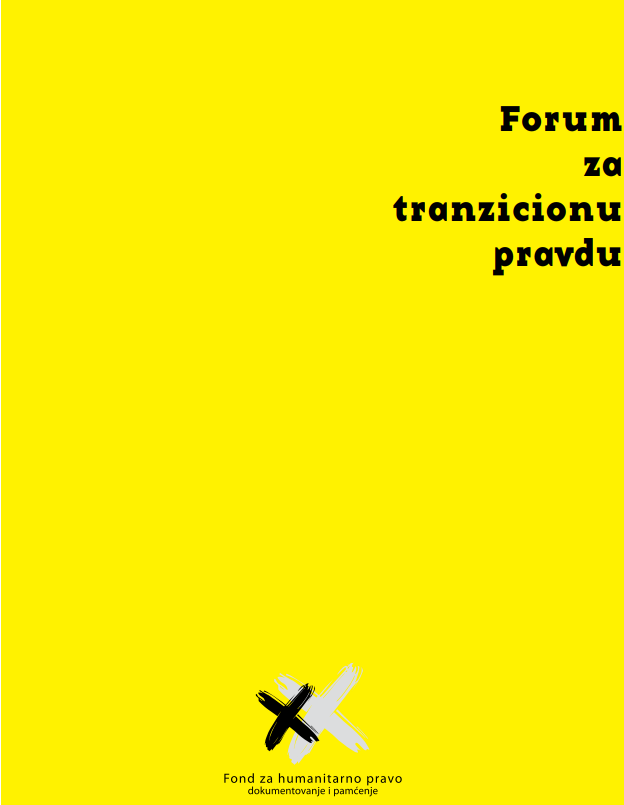

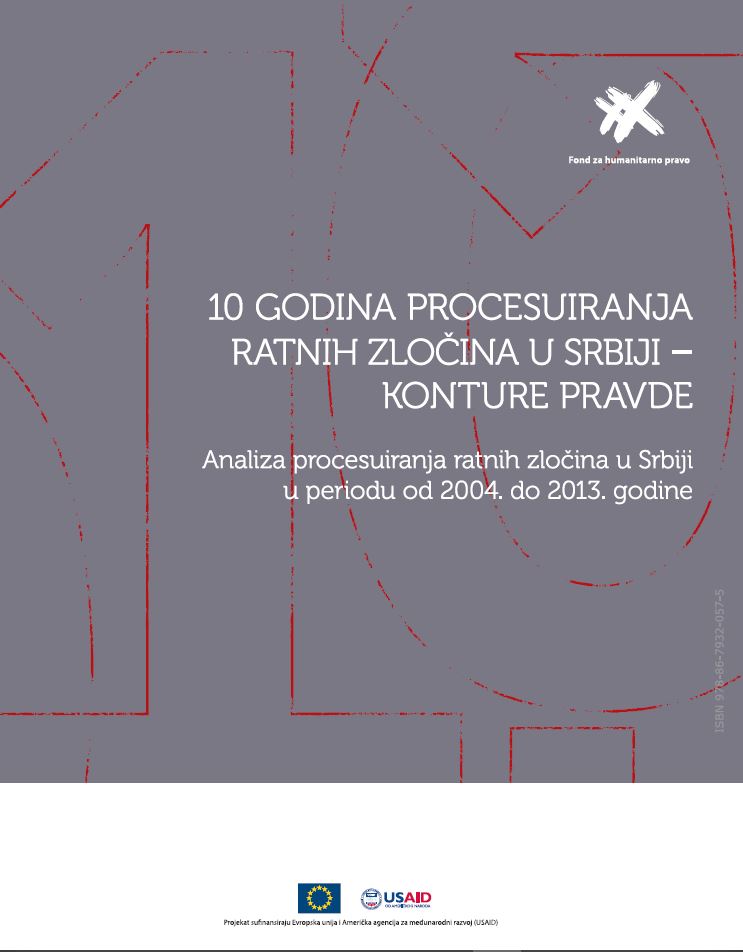
Keywords: war-crime trials in Serbia; facing the past; Yugoslav wars;
At the beginning of 2014, the first decade of work of institutions specialized in processing war crimes in Serbia ended. Judging by the scale and nature of the crimes committed in the wars in the territory of the former Yugoslavia during the 1990s, bringing those responsible for those crimes to justice has had modest results. The lack of interest of institutions in the social process of dealing with the past, as well as their superficial and weak commitment to criminal justice for the past, have made Serbia a state that, on the threshold of EU membership, is an oasis of impunity for thousands of perpetrators. // The War Crimes Chamber of the High Court in Belgrade, the War Crimes Chamber of the Belgrade Court of Appeals, the War Crimes Prosecutor's Office, the High Courts in Prokuplje, Novi Sad, Nis, Požarevac, Leskovac, Kraljevo assisted in the preparation of the Analysis. Ministry of Justice of the Republic of Croatia, Ministry of Interior of the Republic of Croatia, State Court of Bosnia and Herzegovina, State Prosecutor's Office of Bosnia and Herzegovina, Ministry of Security of Bosnia and Herzegovina, Prosecutor's Office of the International Criminal Tribunal for the Former Yugoslavia, OSCE Mission Chamber of Serbia, Documenta and others. Representatives of the War Crimes Prosecutor's Office of the Republic of Serbia, current and former judges of specialized war crimes chambers at the Higher and Appellate Courts in Belgrade, representatives of the Ministry of Interior, representatives of the Victims and Witnesses Assistance and Support Service, and defense attorneys made key contributions. , representatives of non-governmental organizations, victims, former witnesses from the Program for the Protection of Participants in Criminal Proceedings, legal experts and others. In talks with HLC representatives (Nikola Čukanović, Edmir Veljović, Milomir Matović and Sandra Orlović), they expressed their opinion on many aspects of war crimes prosecution in Serbia, problems in everyday work, good practice, mistakes, possible guidelines for improving work, etc. They all share the belief that a long-term strategy for prosecuting war crimes would contribute to improving the work of individual institutions and the overall results of this important social process.
More...
Four war crimes trials are under way in Serbia: two for war crimes against Bosniaks, one for war crimes against Albanian prisoners and one for war crimes against Albanian civilians. On December 12, 2005, the War Crimes Chamber of the Republic of Serbia handed down a verdict for war crimes against prisoners of war in the Ovčara case. On December 14, 2006, the Supreme Court of Serbia overturned the verdict of the War Crimes Chamber of the Belgrade District Court and remanded the case for retrial. In addition, the trial of two former reservists of the Serbian Ministry of the Interior for the murder of a Kosovo Albanian during the NATO bombing is underway before the District Court in Nis. Organized by the Humanitarian Law Center, the mentioned trials are monitored by the families of the victims and representatives of the victims' associations. Encouraging witnesses / victims to participate in war crimes trials is also a HLC priority in supporting domestic war crimes trials.
More...
The verdict of the War Crimes Chamber of the Belgrade District Court against Scorpios accused of killing six Bosniak civilians in Trnovo, BiH, in July 1995, issued on April 10, 2007, is not based on law and facts established during the evidentiary proceedings. It seems that the court was guided by political and not legal reasons, in order to adjust to the attitudes of the Serbian authorities regarding the responsibility for the Srebrenica genocide in the context of the International Court of Justice ruling and show understanding for the patriotic orientations of some Scorpios.
More...
Content: Security Issues, Employment, and Application of Law on the Use of Languages and Anti-discrimination Law in Kosovo; Return of Displaced Persons to Kosovo in 2007 and 2008; Kosovo Institutions Applying the Law on the Use of Languages; Application of Anti-discrimination Law and Law on the Use of Languages in Kosovo Public Companies; Implementation of the Law on the Use of Languages in the Kosovo Education Process.
More...
Following the increase in the number of incidents in North Mitrovica/Mitrovicë which occurred at the end of December 2008, and throughout January 2009, HLC-Kosovo conducted research to systematically monitor the implementation of minority rights in practice, in particular the extent of the implementation of point 31 of article 58 (state responsibilities) of chapter III of the Kosovo constitution and points 3.2 and 3.52 of article 3 of the Law on the Protection and Promotion of the rights of Communities and their Members in Kosovo. The research also sought to identify the level of security in North Mitrovica/Mitrovicë, as well as the causes, consequences and impact that the incidents have had on the overall security situation and everyday life of citizens living in this region. For this purpose, HLC-Kosovo conducted 40 interviews with representatives of local municipal authorities, the judiciary, police, civil society and citizens of all ethnic backgrounds.
More...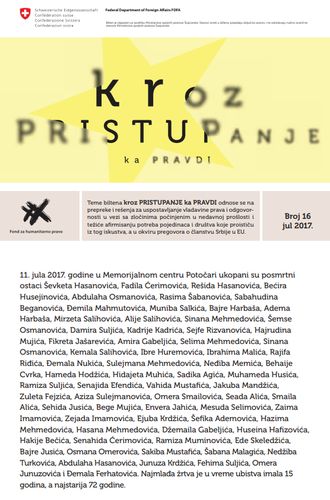
Keywords: Justice; rule of law; with crimes; Serbia; EU
The topics of the newsletter through ACCESS TO JUSTICE refer to obstacles and solutions to the establishment of the rule of law and responsibility in connection with crimes committed in the recent past and will aim to affirm the needs of individuals and society arising from that experience, within the negotiations on Serbia's membership in the EU.
More...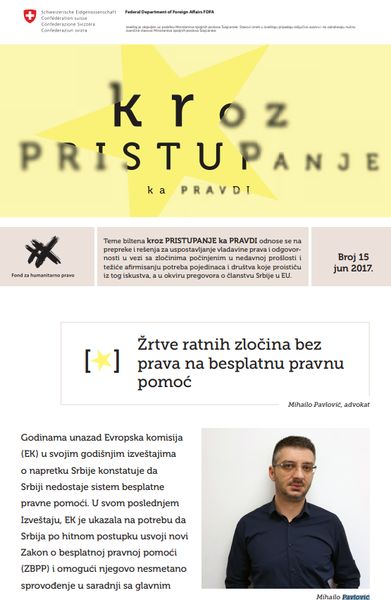
Keywords: Justice; Serbia; legal aid; harmonization with the European Union regulations; ; victims of war crimes; transitional justice; European integration; War Crimes Trials
The new issue of the newsletter through ACCESS TO JUSTICE brings an author's text by Mihail Pavlović about another attempt by Serbia to legally regulate the provision of free legal aid. Free legal aid represents an obligation in the process of harmonization with the European Union regulations, but also an obligation towards socially vulnerable citizens who need it the most, among whom are a large number of victims of war crimes. The News column provides an overview of current affairs in the field of the implementation of transitional justice mechanisms and European integration of Serbia, while the War Crimes Trials column offers an overview of trials held and verdicts passed in the previous period.
More...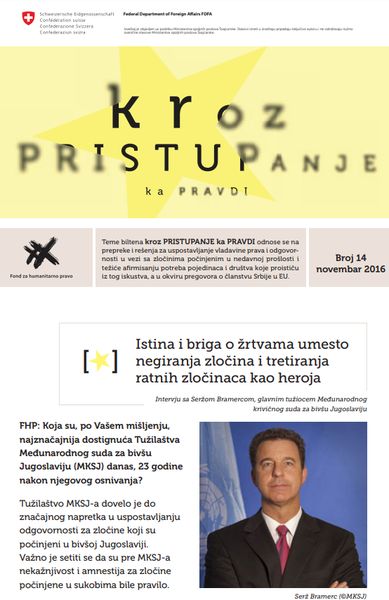
Keywords: Justice; rule of law; with crimes; Serbia; EU
The topics of the newsletter through ACCESS TO JUSTICE refer to obstacles and solutions to the establishment of the rule of law and responsibility in connection with crimes committed in the recent past and will aim to affirm the needs of individuals and society arising from that experience, within the negotiations on Serbia's membership in the EU.
More...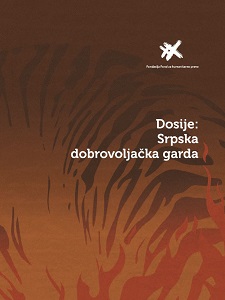
Keywords: Serb Volunteer Guard; wars in Yugoslavia; war in Serbia; paramilitary unit
More...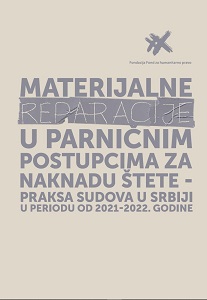
Keywords: Human Rights; post-conflict societies; War Crimes; Crimes against humanity
More...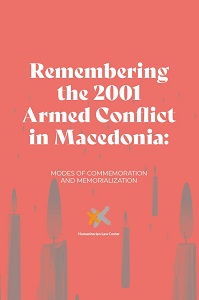
Keywords: North Macedonia; Albania; armed conflict; ethnic communities
More...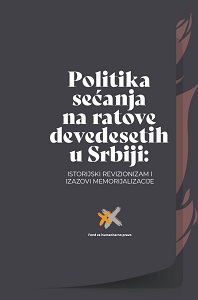
Keywords: Wars in Serbia; wars in Yugoslavia; historical revisionism; memory politics
More...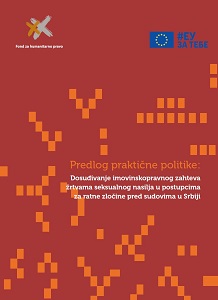
Keywords: war crimes; sexual violence; victims; wars in Yugoslavia; Serbia
More...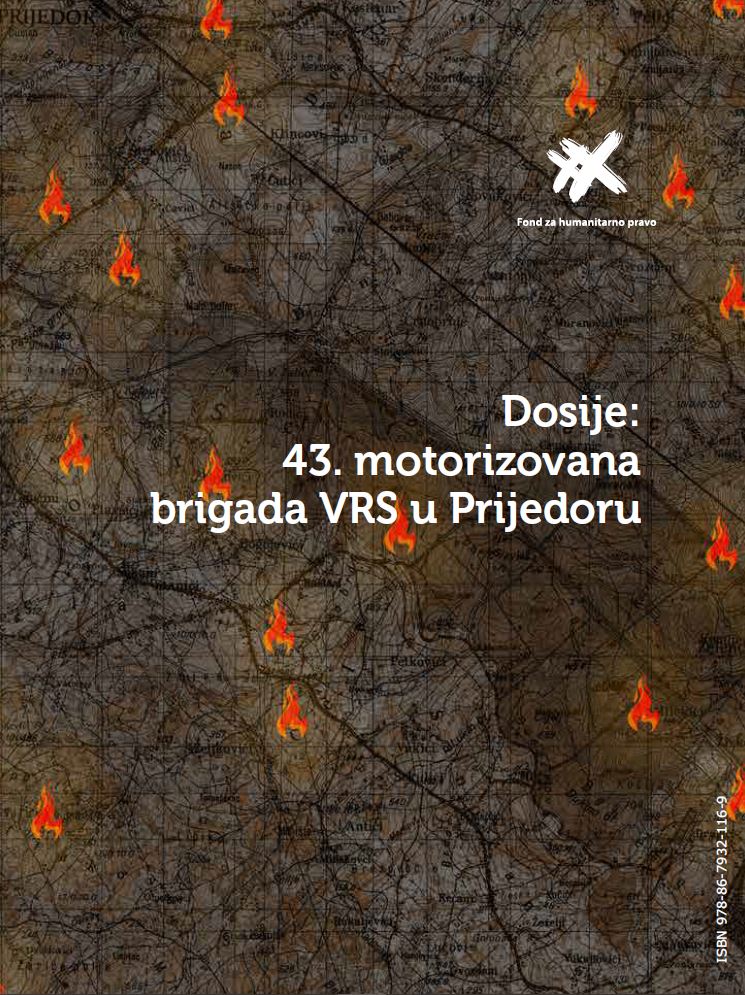
Keywords: wars in Yugoslavia; wars in Bosnia and Herzegovina; Republika Srpska; Krajina Corps; war crimes
More...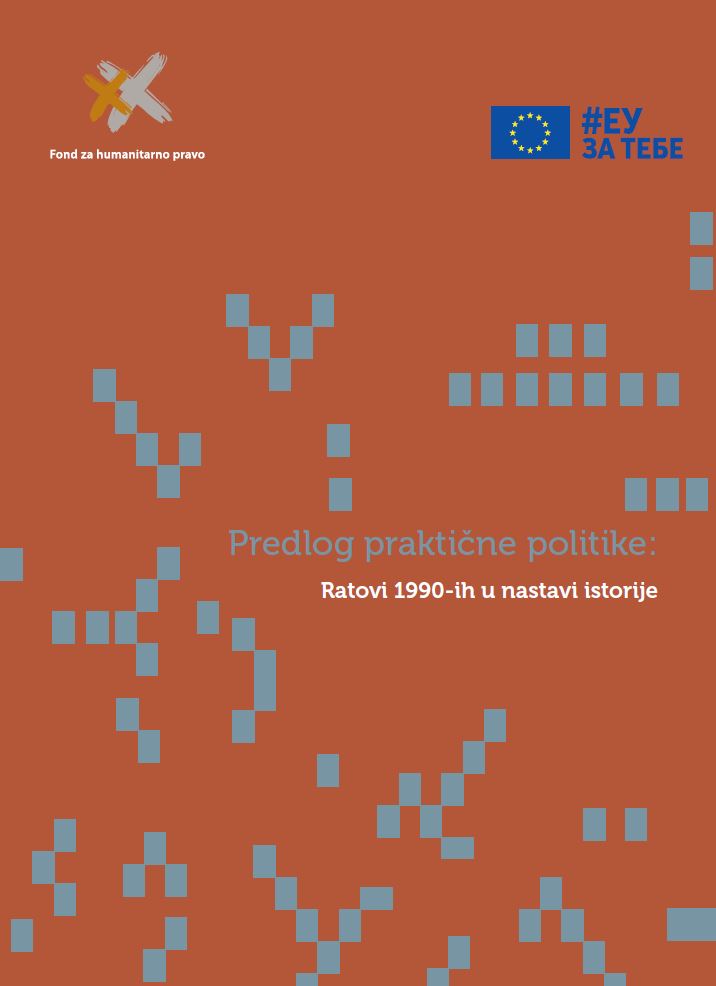
Keywords: Wars in Yugoslavia; war crimes; history education; Serbia
More...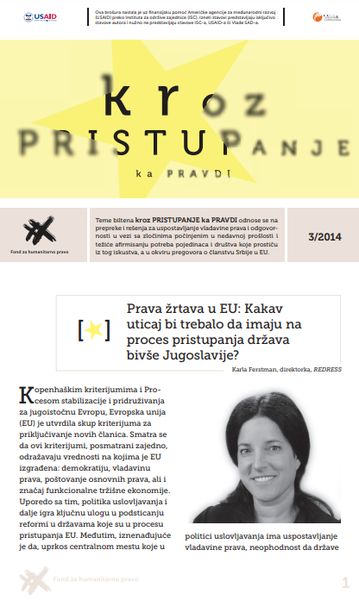
Keywords: Justice; rule of law; war crimes; Serbia; EU; War Crimes Trials; transitional justice; Western Balkans
In the third issue of the newsletter, through ACCESS TO JUSTICE, read about EU legislative solutions in the area of victims' rights and the inevitable alignment of domestic regulations with their provisions for countries that aspire to EU membership. Although it seems that this area has not found its place in the process of negotiations on Serbia's accession to the EU, the director of the British non-governmental organization Redress Carla Ferstman believes that it will necessarily become part of the negotiation material. The bulletin also conveys the very relevant experience of Croatian civil society in the recently completed EU accession process there. The director of the Croatian human rights organization Documenta, Vesna Teršelič, writes about the problems, challenges and opportunities that negotiations on EU accession bring for civil society organizations and the importance of the existence of political will within the state and European institutions for their inclusion in the process. Finally, the permanent sections of the newsletter offer an overview of events and trials for war crimes in the period from April 1, 2014.
More...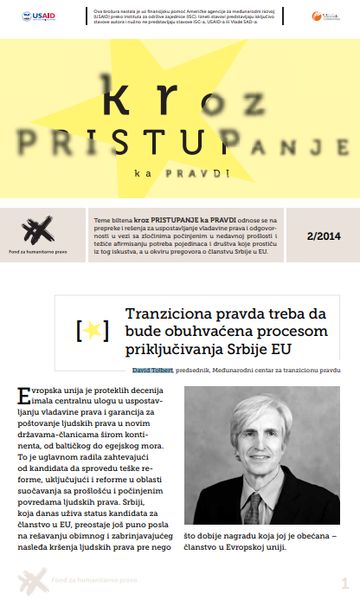
Keywords: Justice; rule of law; war crimes; Serbia; EU; War Crimes Trials; transitional justice; Western Balkans
The president of the International Center for Transitional Justice David Tolbert and the journalist of the Sense agency Nemanja Stjepanović write for the second issue of the newsletter through ACCESS TO JUSTICE. The second issue of the bulletin emphasizes the necessity of including the principles of transitional justice in the EU integration process and points to the practice of not punishing high-ranking members of the Serbian army and police for crimes committed in the wars of the 1990s. In addition, the permanent columns offer an overview of events and trials for war crimes in the period from 01.03.2014.
More...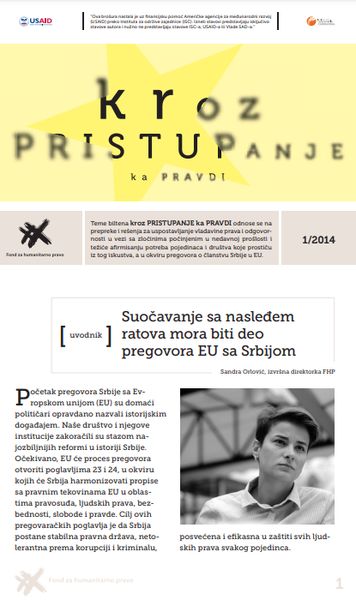
Keywords: Justice; rule of law; war crimes; Serbia; EU; War Crimes Trials; transitional justice; Western Balkans
HLC initiates a series of activities to affirm the confrontation with crimes from the past in the context of the European integration process. Taking into account the fact that for years the institutions have marginalized processes related to dealing with the past, the upcoming EU accession process is a unique opportunity to put the issue of responsibility for war crimes on the agenda and to include the standards of transitional justice in the normative and institutional framework of the Republic Serbia. The bulletin tries to point out the importance of starting the process of dealing with the past for a country that aspires to join the community of European states, but also for the European Union itself. History has shown that unresolved issues from the past are always present and hinder the functioning of the political system, whether it is a state or a community of states. Therefore, both the Republic of Serbia and the members of the European Union have an obligation to their citizens to provide them with a stable political and legal order, in which there is a rule of law and which provides protection and ensures respect for human rights of its citizens.
More...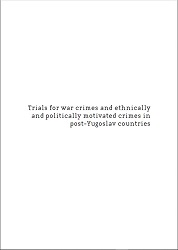
Keywords: war crimes; wars in Yugoslavia;
More...